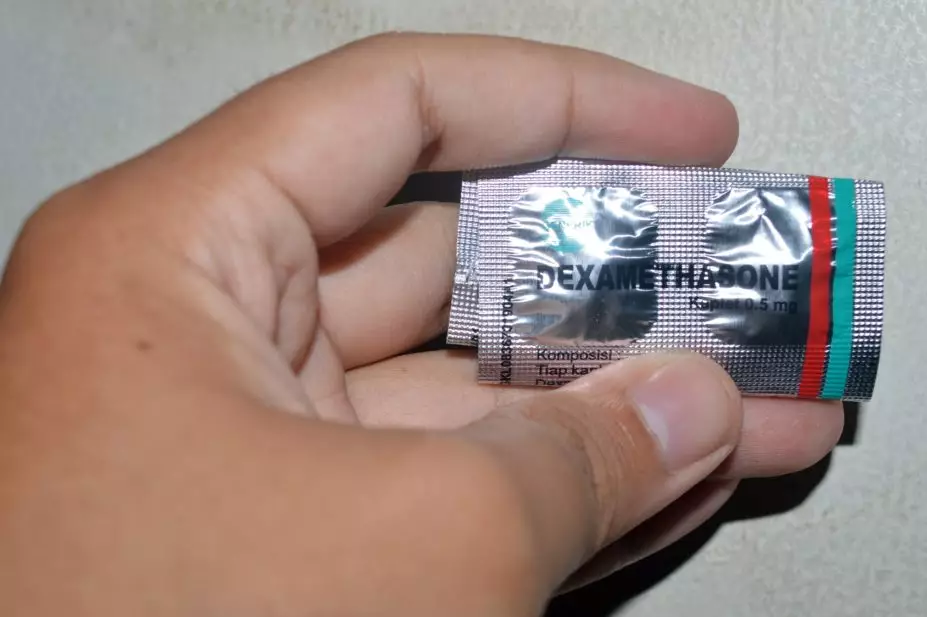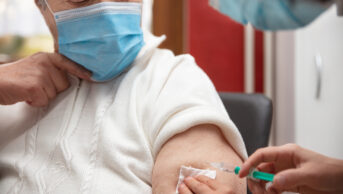
Shutterstock.com
Open access article
The Royal Pharmaceutical Society has made this article free to access in order to help healthcare professionals stay informed about an issue of national importance.
To learn more about coronavirus, please visit: https://www.rpharms.com/resources/pharmacy-guides/wuhan-novel-coronavirus
Dexamethasone has saved around one million lives since it became the first drug to be shown to improve survival in COVID-19 treatment, figures released by NHS England have shown.
In June 2020, results from the Randomised Evaluation of COVID-19 Therapy (RECOVERY) trial, based at Oxford University, suggested that dexamethasone reduced deaths by over a third in ventilated patients and by a fifth in other patients receiving oxygen only.
According to a release from NHS England, the NHS moved quickly to make dexamethasone available to patients on hospital wards in England, “just hours” after the results were announced.
Since then, use of the inexpensive and widely available steroid has saved 22,000 lives in the UK and an estimated one million lives worldwide, NHS England said.
“As well as reducing mortality, dexamethasone also lowered the number of people needing to go for full invasive ventilation in critical care,” explained Mark Borthwick, consultant pharmacist in critical care at Oxford University Hospitals NHS Foundation Trust.
“News stories will probably focus on numbers of lives saved due to a direct impact of dexamethasone on COVID-19 mortality, but another factor is in play here.
“Critical care units were incredibly stretched, and would have been even more so had the numbers of patients requiring full invasive ventilation been higher. By blunting these numbers, the use of dexamethasone in accordance with the RECOVERY trial protocol has played a big part in helping critical care cope with the very high rates of COVID-19 infection we have seen in the UK.
Borthwick added that there was a need to continue research to improve outcomes even further.
“We do not know the optimum dose of dexamethasone, the optimum timing or duration of dexamethasone, or much about the longer term consequences of dexamethasone therapy on secondary infection rates of opportunistic organisms such as candida or aspergillus,” he said.
Matt Hancock, health secretary, said dexamethasone had had “a staggering, staggering impact” since it was introduced to treat COVID-19 patients.
“This is a brilliant example of the real-world impact on people’s lives of cutting-edge research,” he said. “And we’ll keep searching for the best treatments that the world has to offer for COVID-19.”
“Data released today shows that dexamethasone has saved 22,000 lives across the UK, and a million lives across the world.”@MattHancock highlights the life-saving impact therapeutics drugs like dexamethasone has had on #COVID19 patients.
— Department of Health and Social Care (@DHSCgovuk) March 23, 2021
Read more 👇 https://t.co/DLGzYKxMGP pic.twitter.com/EMIryxr0pN
“Thanks to the exceptional work of our researchers, NHS staff and patients, around one million lives may have been saved around the world,” said Simon Stevens, chief executive of NHS England.
“Research that would usually take years produced answers in record time — with results that have reverberated across the globe. Just as this virus has spread across borders, so too must the treatments and vaccinations that are humanity’s shared ‘exit strategy’ from this pandemic.”
The study that showed dexamethasone could save lives
Dexamethasone is a steroid that reduces inflammation by mimicking anti-inflammatory hormones produced by the body. It is only suitable for COVID-19 patients who are already in hospital and receiving oxygen or mechanical ventilation.
During the RECOVERY trial, a total of 2,104 patients were randomised to receive dexamethasone 6mg once per day, either by mouth or by intravenous injection, for ten days and were compared with a control group of 4,321 patients randomised to usual care alone.
Among the patients in the control group, mortality after 28 days was found to be highest in those who required ventilation (41%), intermediate in those patients who required oxygen only (25%), and lowest among those who did not require any respiratory intervention (13%).
The results suggested that dexamethasone reduced deaths by 35% in ventilated patients and by 20% in other patients receiving oxygen only. There was no benefit among those patients who did not require respiratory support.
Based on these results, 1 death would be prevented by treatment of around 8 ventilated patients or around 25 patients requiring oxygen alone, the researchers said.


